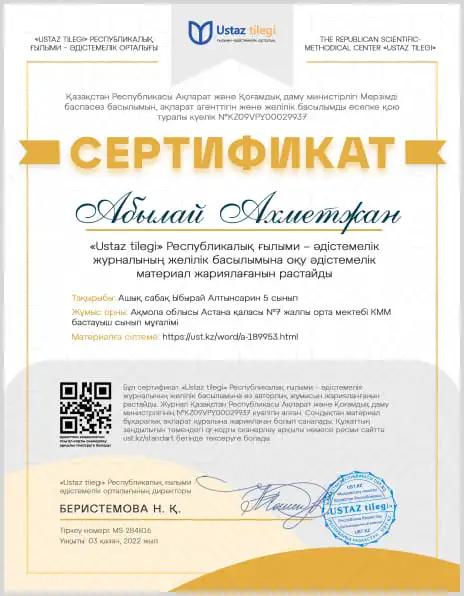SUMMATIVE ASSESSMENT TASKS FOR TERM 4
Summative Assessment for the unit «Space
X»
|
Learning objectives
|
10.2.6 Deduce meaning from context in unsupported
extended talk
on a wide range of general and curricular topics, including talk on a limited range of unfamiliar topics
10.3.7 Use appropriate subject-specific
vocabulary and syntax to talk about a range of general and curricular topics
|
|
Assessment criteria
|
|
|
Level of thinking skills
|
Knowledge and comprehension Application
|
|
Duration
|
20
minutes
|
|
Listening
Task 1. Listen to the conversation and complete the gaps with the most suitable words from the box below. There are 2 words you DO NOT NEED TO USE. Be careful with word forms.
Go to
this link to listen:
https://www.youtube.com/watch?v=w0w7AurxmpE&version=3&hl=ru_RU
devastation person many send
into
orbit
progress explosion
Explore
-
Stephen Hawkings has mentioned on occasions that the only way for humanity to survive is to explore space.
-
We
will have to look for a new planet if we caused a major disaster that results in the
of earth.
-
The
first liquid-fuel rocket was send into in 1926.
-
In
1961, the first was launched into space.
-
Future of space depends on both private and public money.
Speaking
Task 2. Learners work in pairs. First, one learner
speaks on the topic, the second learner assesses
him
/her
according
to the criteria, and then they swap the roles. These questions are not compulsory and can be adapted. There is no
need to use all the questions. Learners can choose a
couple
of questions to
discuss.
Work in
pairs. Student A – talk to your partner for 1-2 min about topic
“Space Travelling”. You can use questions below as a help to organise
your ideas. Student B - listen to your partner’s answer, assess him/her according to the
criteria and give constructive feedback. Then, change your
roles.
|
Criteria for speaking
-
Talk about “Space Travelling”
-
Speak clearly and fluently
-
Use
subject-specific
vocabulary
-
Provide grammatically correct answers
The following questions
will help you organise your speaking:
1. What are some of the
different reasons people travel to space?
5.
In future, as a holiday trip, space commercial flights could be an
option, what are some of the advantages and disadvantages of this
type of travel?
-
What do you consider to be the most important goal for space travel and exploration? Explain and support your opinion.
-
Do you think you would be a good candidate for
long-term space travel? Why or why not? Describe the personal characteristics, past
experiences, skills etc. that make you a good/poor candidate as you explain and support your opinion.
-
Why
do you think companies and governments are spending so much time and money to develop the space tourism industry?
-
What do you think is the most important
space-related industry to develop? Explain and support your opinion.
|
Assessment criteria
|
Task
№
|
Descriptor
|
Mark
|
|
A learner
|
|
Identify the meaning of
|
|
writes ‘many’ in the 1st sentence;
|
1
|
|
words in extended texts
|
|
writes ‘devastation’ in the 2nd sentence;
|
1
|
|
using context information
|
1
|
|
writes ‘orbit’ in the 3rd sentence;
|
1
|
|
|
|
writes ‘person’ in the 4th sentence;
|
1
|
|
|
|
writes ‘progress’ in the 5th sentence;
|
1
|
|
Talk about given topics
|
|
talks on topic;
|
1
|
|
using appropriate topic
|
|
speaks clearly and fluently;
|
1
|
|
related vocabulary and
sentence structures
|
2
|
|
uses subject-specific vocabulary correctly;
|
1
|
|
provides grammatically correct answers;
|
1
|
|
|
|
gives constructive feedback.
|
1
|
|
Total marks
|
10
|





 Rubrics for providing information to parents on the results of
Summative Assessment for the unit «Space X»
Rubrics for providing information to parents on the results of
Summative Assessment for the unit «Space X»
Learner’s name
|
Assessment criteria
|
Level of learning achievements
|
|
Low
|
Middle
|
High
|
|
Identify the meaning of words in extended texts using context information
|
Experiences difficulties in identifying the appropriate word to
complete the gap.
|
Experiences some difficulties in identifying the appropriate word to complete the gap.
|
Confidently identifies the appropriate word to complete the gap.
|
|
Talk about
given topics using appropriate topic related vocabulary and sentence structures
|
Experiences difficulties in using topic related vocabulary and grammatically correct sentences while responding to questions. Makes long unnatural pauses, and
mispronounces
topical
words.
|
Experiences some difficulties in using
topic related
vocabulary
and grammatically correct sentences while responding to questions. Makes some mistakes while pronouncing words and phrases.
|
Uses a wide range of topical vocabulary and grammatically correct sentences showing a good control of grammar and pronunciation.
|
Transcript
Stephen Hawkings has
mentioned on numerous occasions that the only way for humanity to
survive is to explore space. The validity of his arguments has yet
to be seen. However, it is important to note the possible need to
explore space if we caused a major disaster that results in the
destruction of earth we will have to search for a new planet. Let's
look at the accomplishments to date.
The first liquid-fuel
rocket was launched in 1926, then in 1942 the first rocket was
launched into space. In 1961, the first human was launched into
space. Since then, many space flights have been made, most
successful but some ending in explosion. There are currently two
space stations in orbit. These stations are used to test long-term
effects of living in space. So far, the longest a person has spent
in space was 437 days. Future development of space depends on both
private and public money. With government's low on cash only, China
is showing interest in space stations. In addition, there are
private companies testing space technology such as space stations
and ships for transportation.
These companies are making
advances and they promise regular space travel soon.
The first use for space travel is entertainment.
But at 200,000 dollars per ticket the demand will be low. Until
technology becomes cheaper, flying into space will

1






 Дайын ҚМЖ. Барлық пәндерден 2022-2023 оқу жылына, жаңа бұйрыққа сай жасалған
Дайын ҚМЖ. Барлық пәндерден 2022-2023 оқу жылына, жаңа бұйрыққа сай жасалған